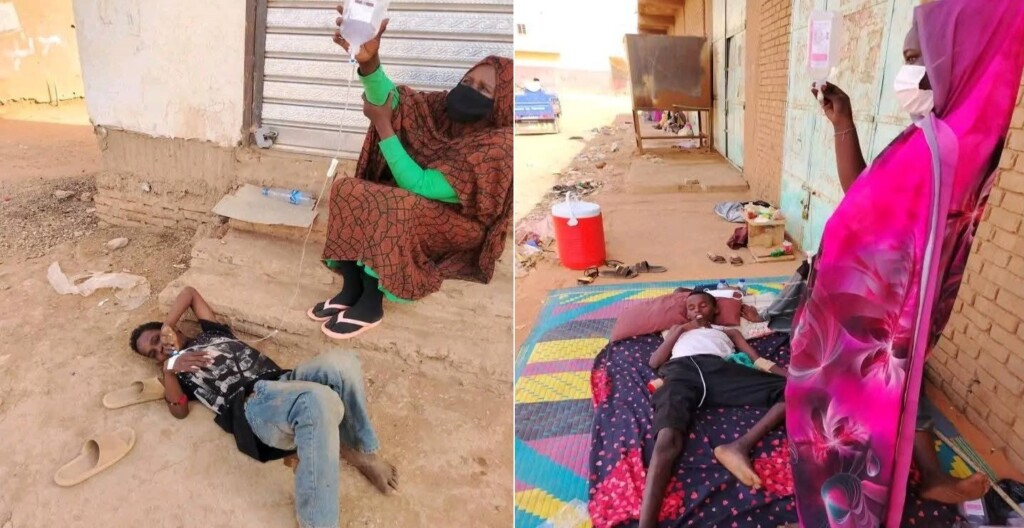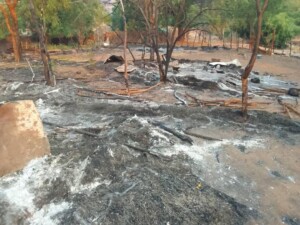Sudan’s healthcare falters as cholera outbreak expands

Cholera patients being treated on the ground outside a hospital in Khartoum, as there is insufficient space inside (Photo: RD Own Correspondent)
The Khartoum state Ministry of Health has reported 1,375 new cholera cases and 23 deaths on Wednesday. The number of cases increased from the previous day by more than 400, while deaths decreased by five, the ministry says, as Sudan faces a major cholera outbreak, exacerbated by ongoing armed conflict and mass displacement.
Sudan routinely experiences seasonal spikes in cholera during this time of year, however, the current crisis has been significantly worsened by the war. Widespread destruction of infrastructure, limited access to healthcare, and severe water shortages have accelerated the spread of the disease, particularly in Khartoum and surrounding states.
Dr Mohammed Tijani, Director of the General Department of Emergency and Epidemiology in Sudan, reported on Thursday, 29 May, that the cholera recovery rate had reached 92 per cent. He attributed the rise in detected cases to enhanced efforts by field clinics, response teams, and irrigation centres. According to the data, 95 per cent of cases were among adults, while children accounted for five per cent. The Ministry of Health in Khartoum state had recorded 942 cases and 28 deaths on Tuesday. Tijani also confirmed that the diarrhoea currently spreading in Khartoum has been identified as cholera through laboratory testing, refuting any claims of chemical contamination.
Tijani also stated that cholera vaccination campaigns had continued for a third day in Jebel Awlya in Khartoum state and would expand to other localities once three million vaccine doses arrive from abroad. As part of the emergency response, the Ministry of Health also announced plans to open 250 irrigation centres within residential neighbourhoods to support local treatment.
Managing cholera isolation
Tijani further explained that the ministry has equipped 12 isolation rooms in Khartoum state, with a total of 550 beds across Omdurman Children’s Hospital, Omdurman Teaching Hospital, Umbada Hospital, and El Nu Hospital.
Additionally, volunteers reported that the health authorities evacuated the cholera isolation centre at El Nu Hospital in Omdurman, transferring all patients to isolation centres at Mohammed El Amin Hamed Children’s Hospital, near Omdurman Hospital, Embda Model Centre, and El Gezira Islang Centre. They highlighted the significant number of cases at the Omdurman isolation centre Mohammed El Amin Hamed, which includes children, and noted that substantial quantities of medical solutions have been provided to the isolation centre. However, they indicated a shortage of doctors and emphasised the urgent need for water and perfusion salts.
Volunteers questioned over cholera reports
The Eighth Hot Revolution Resistance Committees in Omdurman denounced the summons and interrogations to which volunteers Ali Jabbay and Ahmed Qassem, one of the founders of the El Nu Teaching Hospital Volunteer Initiative, were subjected to. In a statement, it pointed out that the summons came against the backdrop of spreading the truth and revealing the extent of the suffering caused by the spread of the cholera epidemic and the deterioration of health care. She considered what happened a new episode in the series of repression.
One million children at risk as cholera spreads
UNICEF has warned that more than one million children in Khartoum state are at risk due to the ongoing cholera outbreak. The World Health Organisation (WHO) reported that daily cholera cases rose sharply from 90 to 815 between 15 and 25 May- a ninefold increase in just 10 days. Tijani stated that repeated attacks on power stations in Khartoum state over the past month have caused prolonged power shortages and worsened water shortages, further exacerbating the outbreak.
Significant increase in cholera cases in Khartoum and South Darfur
The Resilience Coalition has reported that Khartoum state recorded more than 3,000 new cholera cases within three days, bringing the total to approximately 8,000. Additionally, the number of deaths has increased by more than 80, reaching around 200. The report further indicated that cholera cases in Khartoum rose from 5,000 to 8,000 in the last three days, underscoring the rapid and extensive nature of the outbreak. According to the coalition, this surge is attributed to deteriorating water and sanitation conditions, contamination of water sources, and limited access to medical care, all of which exacerbate the severity of cases and increase the mortality risk. The ongoing internal displacement towards the capital is also contributing to the spread of the disease.
The report warned of eight new cholera cases and one death in Nyala, South Darfur, describing it as a dangerous development. The coalition expressed concern that the emergence of cases in Darfur poses a significant risk of further spread in areas with large populations of displaced persons and refugees who are living under poor health and environmental conditions. The ongoing conflict in the region, as in other parts of Sudan, complicates efforts to control the outbreak. The report emphasised that cholera remains treatable if detected early and intravenous fluids are available and called for the urgent implementation of a response plan.
Cholera cases reported in Sennar and North Kordofan
The Ministry of Health in Sennar state reported 80 confirmed cases of cholera, including six deaths. In North Kordofan, El Rahad Hospital documented 15 cholera-related deaths and more than 100 cases within two days. Sources indicated that the disease started spreading in the area two weeks ago.
In Khartoum state, authorities initiated a vaccination campaign as hundreds of cholera cases are being reported daily in Khartoum and Omdurman, with 24 deaths reported on Friday. The situation has been exacerbated by an 11-day power outage due to the destruction of three power stations in drone attacks, disrupting access to drinking water and leading residents to draw water from the Nile.
Dr Fathelrahman El Amin, Director of the Khartoum Health Ministry, reported more than 80 new cases daily in Omdurman and the establishment of 15 new isolation centres. Médecins Sans Frontières (MSF) confirmed 2,500 cases in three weeks, including 500 in a single day. Federal Health Minister Dr Haitham Mohamed Ibrahim stated that weekly case rates have reached 600-700 and noted the creation of at least eight treatment centres, along with efforts in water chlorination and sanitation. The vaccination campaign started in Jebel Auliya with 115,000 doses and is expected to expand to four more localities in the coming days. Ibrahim expressed optimism that infection rates will begin to decline in the upcoming weeks.
Electricity gradually restored in Omdurman
Electricity has begun to return gradually to Omdurman in Khartoum state, following an 11-day outage caused by the bombing of three power stations, according to reports. Residents reported a complete lack of access to drinking water during the blackout, which led many to draw water directly from the Nile. Residents also report that water barrel prices have soared due to high demand and limited supply.











 and then
and then